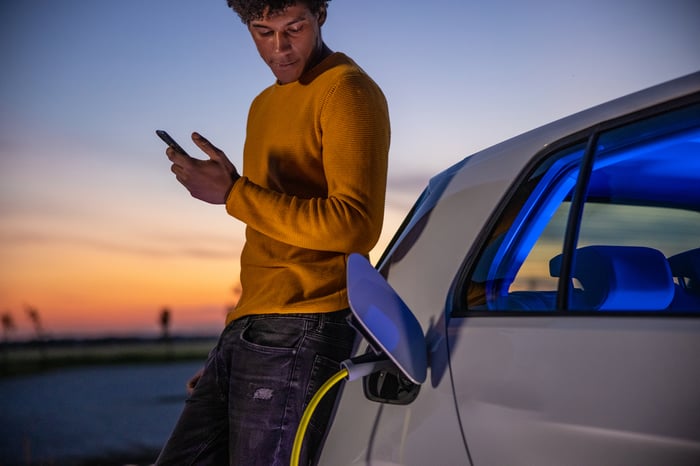Although the electric vehicle (EV) industry is often portrayed as a tight race between start-ups and legacy automakers jockeying for market share, the reality is that it is a two-horse race between Tesla (TSLA -1.11%) and its Chinese competitor, BYD (BYDDY 4.08%).
Today, Tesla is the most valuable automaker in the world with a valuation of more than $670 billion. Meanwhile, up-and-coming BYD is ranked third, worth more than $90 billion.
Clearly, there's quite a large difference separating the two companies. But as BYD applies the same strategies that helped it become the leading automaker in China's highly competitive market, it's possible that by 2025 the company will narrow the gap and perhaps even dethrone Tesla.

Image source: Getty Images.
Power surge
One of the primary factors contributing to Tesla's ascension to the top of the auto industry is in its near-perfection of mass-producing EVs at extremely low costs. Few other companies come close to Tesla's ability to produce large numbers of vehicles and maximize profit margins -- but BYD does.
So far in 2023, Tesla has sold more than 1.3 million vehicles. But thanks to a record breaking third quarter, BYD surpassed Tesla with a total of 2.1 million units, a 76% increase from a year ago. Over the same stretch, Tesla's deliveries increased just 45%.
It should be noted that BYD manufactures pure, battery-powered EVs (BEV) and plug-in hybrids (PHEV), while Tesla only sells BEVs. Although BYD's production numbers account for both types of vehicles, its BEV production is on the verge of surpassing Tesla as well. Total BEV sales for BYD year to date (YTD) total a little more than 1 million units, just 23% less than Tesla.
Amid the surge in production, BYD's profits YTD grew by nearly 142% from last year's more than $3 billion. Over the same stretch, Tesla's profit fell by 13%, primarily attributed to its rising costs and lowered vehicle prices in the midst of its ongoing price war. As a result of BYD's successful run and ability to efficiently scale, BYD now boasts higher gross-profit margins than Tesla, a nearly unthinkable feat just a few years ago.
Data source: YCharts.
Tapping into new markets
For most of BYD's history, it primarily sold vehicles in China. Yet, now that it has risen to the top of the Chinese market, BYD has its sights set on expanding internationally.
The company is building a factory in Thailand, which is set to begin production in 2024. In late June, the company announced a new plant will be constructed in Brazil, while deliveries in Mexico recently started as part of the company's larger focus on expanding in Latin America.
Furthermore, BYD already has a presence in countries such as Japan, India, Malaysia, Australia, and Singapore. While exports remain a small share of total sales, they are up sharply from being almost non-existent in 2022.
Even though Tesla has its own plans to enter new markets, BYD is uniquely suited for success in middle-income countries due to its expansive suite of more than two dozen vehicles at a range of price points. Like Tesla, the company offers high-end luxury EVs, but BYD also caters to more cost-conscious consumers with vehicles like its Seagull going for less than $11,000.
BYD is able to sell cars this cheap thanks to its uniquely efficient, vertically integrated production model. The company was originally founded as a battery manufacturer in 1995 and has leveraged this experience to streamline what is often the most challenging and costly aspect of the EV supply chain. Moreover, it also has specific divisions for every component of vehicle production, such as telematics assembly and air conditioners. This has enabled almost all components to be made entirely in-house. Add it all up, and what usually takes the average automaker around four years from start to finish takes BYD just 18 months.
An electrifying showdown
While BYD's ascension to become a challenger to Tesla is undoubtedly admirable and likely makes it a no-brainer for investors looking to gain EV exposure, the likelihood that BYD will be able to increase its market value by more than 600% by 2025 is slim.
However, it might be too soon to rule it out. The same aspects of Tesla's business model that catapulted it to the top are present in BYD, if not more so. In a certain sense, BYD is everything Tesla claims to be but more. It is vertically integrated and efficiently scales mass production of vehicles while catering to various consumer-spending levels due to its low prices.
Outdoing Tesla at its own game, profit margins have grown to industry-leading levels, and with international expansion efforts underway, BYD remains the most likely candidate not named Tesla to become the most valuable EV company in the world. Reaching this mark by 2025 might be a challenge, but if we move the deadline to somewhere like 2030, then the odds increasingly tilt in BYD's favor.






